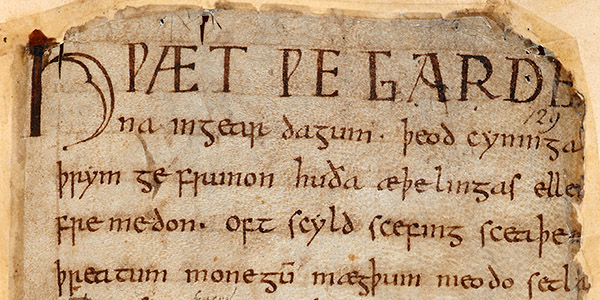Excerpted from Said + Done, MIT SHASS newsletter | March 2022 Arthur Bahr, an associate professor of literature at MIT, is currently completing a book on the Pearl-Manuscript — a rare surviving 14th-century document that includes Pearl, and three other works, Patience, Cleanness, and the famous chivalric romance story, Sir Gawain and the Green Knight (recently adapted into a movie, The Green Knight.) All four works are critical to our understanding of the medieval world and literature and two of them, Pearl and Gawain, are considered masterpieces. “Part of my job,” Bahr says “is to help these texts be audible and resonant in a very different cultural, social, and religious context than the one in which they were created.” Bahr’s book explores the tension between the unknown author’s spiritual angst and evolution, conveyed in the dream vision of the Pearl poem, and the very worldly commentary on 1300s court culture and the knight’s chivalric code that appears in Sir Gawain. “To have one manuscript/author conveying both the inner growth of Pearl and something like Gawain, which translates those soulful understandings and ideals to something more like the ‘real world,’ is an extraordinary achievement.” Hand-written on parchment, the Pearl-Manuscript is both a literary work and an artifact. There is only one copy in existence, and it is full of scribal errors — features common in medieval literature and part of the fascination of such works for Bahr. “These scribal errors show that there is a gap between what the author originally wrote and the words that have come down to us in material form. All we can do is speculate,” he says, “in the original, medieval sense of the word: study what remains in order to trace the outlines of something not fully knowable.” Similarly, although it is generally believed (based on stylistic, thematic, and dialect similarities) that the four poems in the Pearl-Manuscript have the same author, that too is an educated speculation.  Bahr, who studied Latin and Ancient Greek in high school, fell in love with medieval literature as an undergraduate at Amherst College, where he majored in English, French, and medieval studies. He earned his PhD in English language and literature from the University of California, Berkeley, and initially envisioned settling into a teaching career at a small liberal arts college. When he joined the MIT faculty in 2007, he had some trepidation about teaching at a large research university; however, he quickly came to appreciate the Institute’s strengths. “It’s important to recognize how much of an outlier MIT is in requiring eight humanities, arts, and social science classes for all undergraduates, and requiring concentrations,” he says. “That gives people like me and others in the School of Humanities, Arts, and Social Sciences a platform that a lot of our colleagues elsewhere don’t have.” MIT’s extraordinary students also won Bahr over. “MIT students are amazing,” he says, describing in particular how quickly they pick up Old English. “It’s like watching a Ferrari go around a racecourse. I just give them basic materials and they go to town. It’s inspiring.” A consummate teacher (in 2015, he received the Margaret MacVicar Faculty Fellowship, MIT’s highest undergraduate teaching award), Bahr typically teaches Beowulf, works of Chaucer, and other medieval texts. He also teaches more contemporary poetry and a class in the Old English language, which is among his favorites. Old English, the language of Beowulf, dates to the mid-5th century and bears almost no resemblance to any version of English spoken today; its writing system even includes runic characters.
Bahr, who studied Latin and Ancient Greek in high school, fell in love with medieval literature as an undergraduate at Amherst College, where he majored in English, French, and medieval studies. He earned his PhD in English language and literature from the University of California, Berkeley, and initially envisioned settling into a teaching career at a small liberal arts college. When he joined the MIT faculty in 2007, he had some trepidation about teaching at a large research university; however, he quickly came to appreciate the Institute’s strengths. “It’s important to recognize how much of an outlier MIT is in requiring eight humanities, arts, and social science classes for all undergraduates, and requiring concentrations,” he says. “That gives people like me and others in the School of Humanities, Arts, and Social Sciences a platform that a lot of our colleagues elsewhere don’t have.” MIT’s extraordinary students also won Bahr over. “MIT students are amazing,” he says, describing in particular how quickly they pick up Old English. “It’s like watching a Ferrari go around a racecourse. I just give them basic materials and they go to town. It’s inspiring.” A consummate teacher (in 2015, he received the Margaret MacVicar Faculty Fellowship, MIT’s highest undergraduate teaching award), Bahr typically teaches Beowulf, works of Chaucer, and other medieval texts. He also teaches more contemporary poetry and a class in the Old English language, which is among his favorites. Old English, the language of Beowulf, dates to the mid-5th century and bears almost no resemblance to any version of English spoken today; its writing system even includes runic characters.
Here’s the first line of Beowulf in Old English and in translation: Hƿæt ƿe gardena in geardagum þeodcyninga þrym gefrunon hu ða æþelingas ellen fremedon
 Not surprisingly, Bahr teaches Old English because an MIT student asked him to. It was 2013, and Bahr was teaching a class on Chaucer, who writes in Middle English (which is somewhat more accessible to our ears that its predecessor). Afterwards, one student — Anna Ho ’14, then a junior and physics major — came up and asked if he would consider teaching Old English. “She’s the reason I teach this class,” Bahr says. “I said yes, and also ‘you’re responsible for getting at least six students to sign up!’ On that first day, I had 26 students. And, the class has remained pretty popular ever since.” Students are so engaged, he suggests, because medieval literature is both challenging and rewarding: it provides a portal to another world. Not only is the language almost foreign, but medieval texts commonly intertwine music, astronomy, grammar, religious doctrine, and fantasy in ways not often seen today. “The medieval worldview is so profoundly different from ours, and I think that’s exciting.” Read more here…
Not surprisingly, Bahr teaches Old English because an MIT student asked him to. It was 2013, and Bahr was teaching a class on Chaucer, who writes in Middle English (which is somewhat more accessible to our ears that its predecessor). Afterwards, one student — Anna Ho ’14, then a junior and physics major — came up and asked if he would consider teaching Old English. “She’s the reason I teach this class,” Bahr says. “I said yes, and also ‘you’re responsible for getting at least six students to sign up!’ On that first day, I had 26 students. And, the class has remained pretty popular ever since.” Students are so engaged, he suggests, because medieval literature is both challenging and rewarding: it provides a portal to another world. Not only is the language almost foreign, but medieval texts commonly intertwine music, astronomy, grammar, religious doctrine, and fantasy in ways not often seen today. “The medieval worldview is so profoundly different from ours, and I think that’s exciting.” Read more here…
